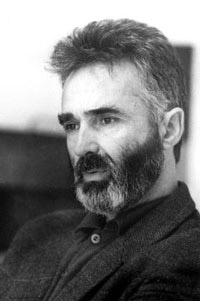 Born Croatian, bosnian patriot, writing in Serbo-Croatian, diplomat and politician of Yugoslavia, Ivo Andrić (Dolac, close to Travnik, 1892 - Belgrade, 1975) wrote, next to his political carreer, an immense literary work.
Born Croatian, bosnian patriot, writing in Serbo-Croatian, diplomat and politician of Yugoslavia, Ivo Andrić (Dolac, close to Travnik, 1892 - Belgrade, 1975) wrote, next to his political carreer, an immense literary work.
Ivo Andrić was born in a poor catholic craftsmen family. Raised by franciscans, he studied history and literature in Zagreb, Vienna, Cracow and Graz, where he held a thesis on spiritual Life of Bosnia under the Turks in 1923. His first poems were released in 1911 in the review Bosanska vila (the bosnian Fairy) then in 1914 in the anthology Hrvatska mlada lirika (New Croatian Poetry).
His engagement in the revolutionary organization Young Bosnia and his standpoint allowed him to know during the First World War the Austrian jails and the exile which will give him inspiration for two books, Ex Ponto (1918) and Concerns (1920), where one can already find the topics which will mark all his work : human fragility, the tragic and often absurd destiny of men, evil under consideration form the side of "those who do it" as well as from the side "of those who undergo it", etc.
Form 1921 to 1941, Andrić was diplomat of the kingdom of Yugoslavia and was thus in 1941, as embassy secretary, co-signatory in Berlin of the germano-Yugoslavian pact .
Having chosen to return to Belgrade, he refused to agree with Nedic's regime, forbid the publication of his works during the Nazi occupancy and started to write two novels which will be released after the war The Bridge on the Drina evokes a small borough of Bosnia (where the author lived part of his childhood), Višegrad, located near the border of Serbia, where life is organized around this bridge. Crossing point of the Serb orthodox, Croatian catholic, Muslim and Jewish communities, it symbolizes perenniality and continuity in spite of the vicissitudes imposed by nature and men but also life "which wears unceasingly and exhausts and yet lasts and remains, unbreakable like the bridge on Drina". It also underlines the complexity of the bosnian identity. The Chronicle of Travnik (1945) is a rich story that describes the conflicts and the tragedies generated at the time of Napoleon by the arrival of a French consul in a small town of Eastern tradition, and is described like a place of confrontation between the East and the West, important topic to Andrić.
Convinced to the Yugoslav idea, Andrić entered to the Communist Party of Yugoslavia after the Second World war, became deputy in the National Assembly of the People's Republic of Bosnia-Herzegovina and in the federal Parliament of the federative socialist Republic of Yugoslavia, member of the redaction of several newspapers and, in 1946, member of the Serb Academy of Sciences and Arts, then president of the Association of Serb Writers.
Winner of several literary prices in Yugoslavia, Andrić obtained in 1961 the Nobel Prize of literature.
Among his many other stories, one can quote the Elephant of the vizier (1948), which evokes the relationship between the declining Ottoman administration and the bosnian population, and the History of serf Siman (1948) which occurs during the power transfer between the Ottoman Empire and the Austrian Empire. Titanic was adapted by Emir Kusturica in 1980.
Andrić, who had described the universality through his native Bosnia, spent the rest of his life in Belgrade.
Extract of the superb short story "A letter of 1920", describing Bosnia : "Because this poor and old-fashioned country where four different religions live together would require four times more love, mutual comprehension and tolerance than the other countries."
Official site : www.ivoandric.org.yu
Bibliography on Amazon.com :
 Born in 1948, he is certainly the most well-known dramatic Serb author in his country as abroad. Author of twenty plays translated in more than fifteen languages, among which "Marathonians run their lap of honour", "Radovan III", "the balcanic spy", and the play "spring in January" which was used as a basis for
Born in 1948, he is certainly the most well-known dramatic Serb author in his country as abroad. Author of twenty plays translated in more than fifteen languages, among which "Marathonians run their lap of honour", "Radovan III", "the balcanic spy", and the play "spring in January" which was used as a basis for  Dušan Kovačević : We went on the basis of a story, that of my play, before the war burst but then, we could not avoid this subject. We were working on the scenario while all the events in the country occurred ; the third part of film became synchronous with the bursting of ex-Yugoslavia.
Dušan Kovačević : We went on the basis of a story, that of my play, before the war burst but then, we could not avoid this subject. We were working on the scenario while all the events in the country occurred ; the third part of film became synchronous with the bursting of ex-Yugoslavia.
 Abdulah Sidran was born in 1945 in Bieniesevo, in Bosnia-Herzegovina. He quickly became one of the greatest poets of Bosnia-Herzegovina, but also of all ex-Yugoslavia. Some of his collections marked the literary life of his country (Chahbase, Ars poetica, Testament of marvellous) and were partially translated into various languages. He is universally known as scenario writer of films of Emir Kusturica (
Abdulah Sidran was born in 1945 in Bieniesevo, in Bosnia-Herzegovina. He quickly became one of the greatest poets of Bosnia-Herzegovina, but also of all ex-Yugoslavia. Some of his collections marked the literary life of his country (Chahbase, Ars poetica, Testament of marvellous) and were partially translated into various languages. He is universally known as scenario writer of films of Emir Kusturica ( Gordan Mihić was born in Mostar in 1938. After studies of literature in
Gordan Mihić was born in Mostar in 1938. After studies of literature in